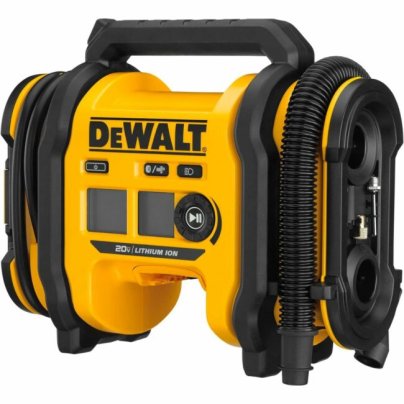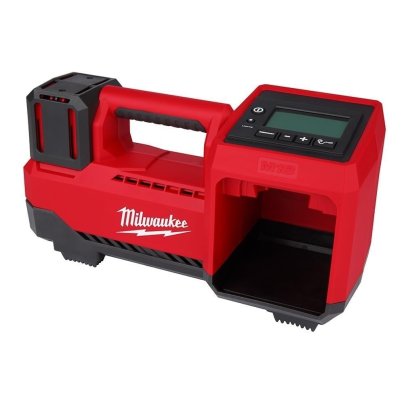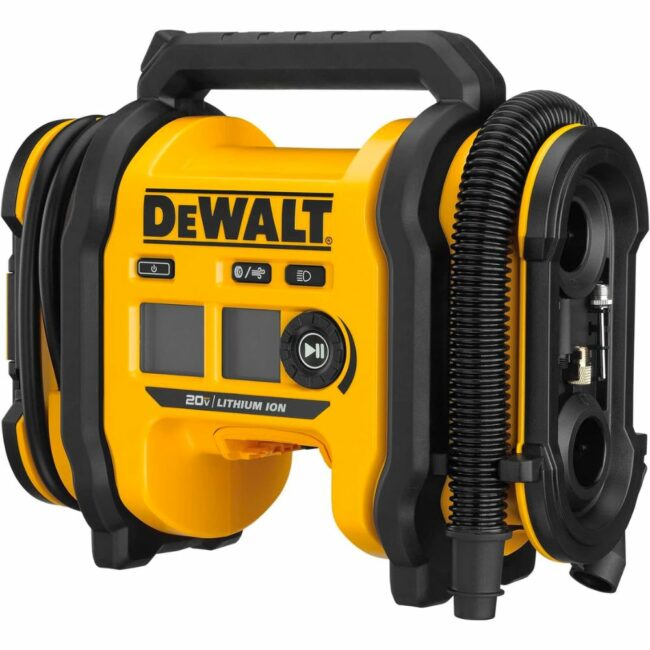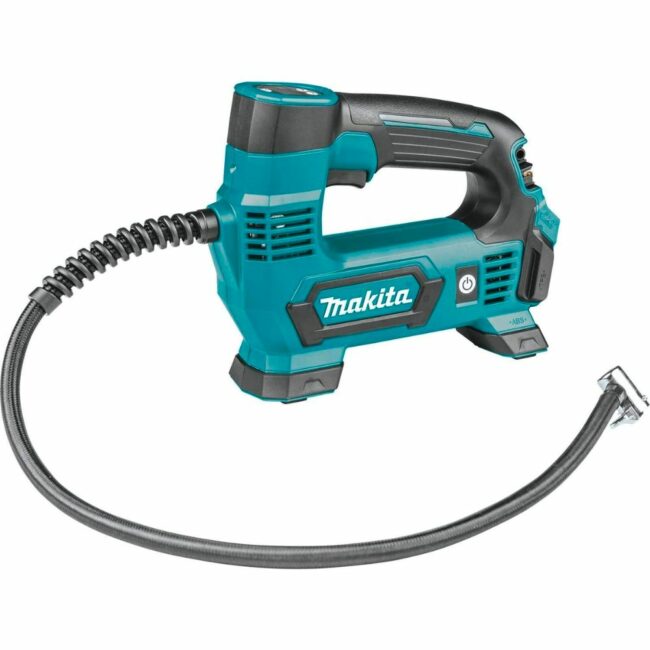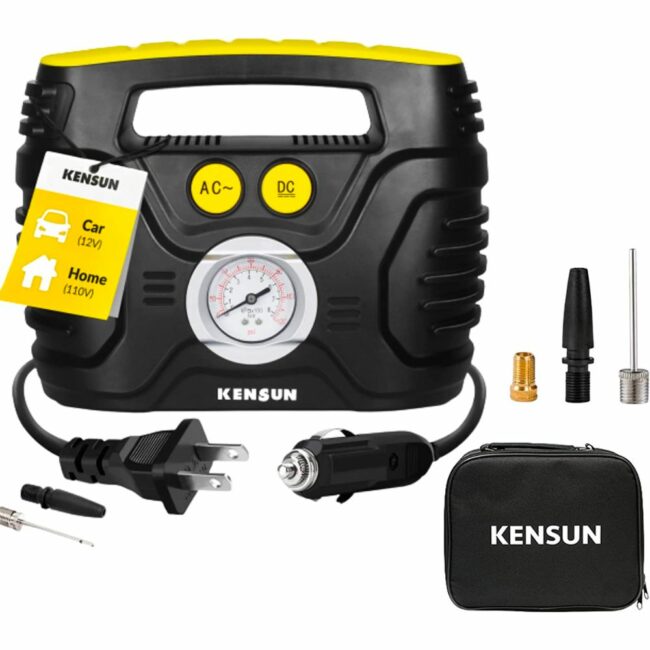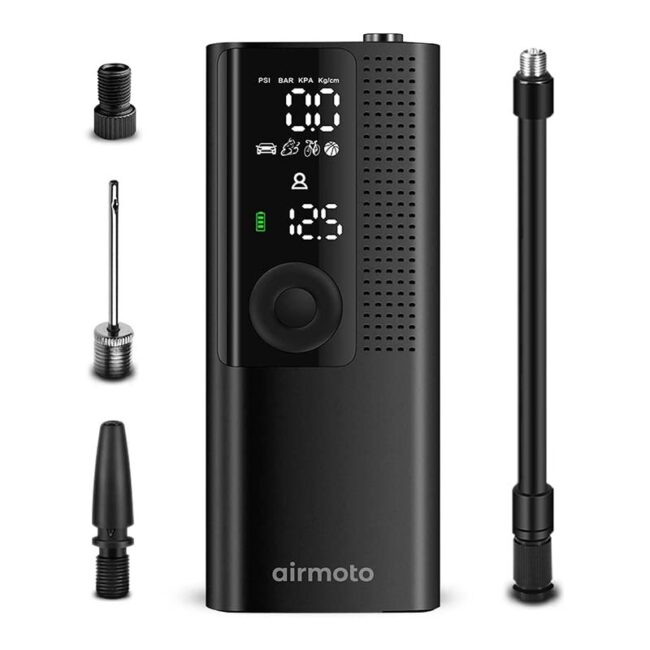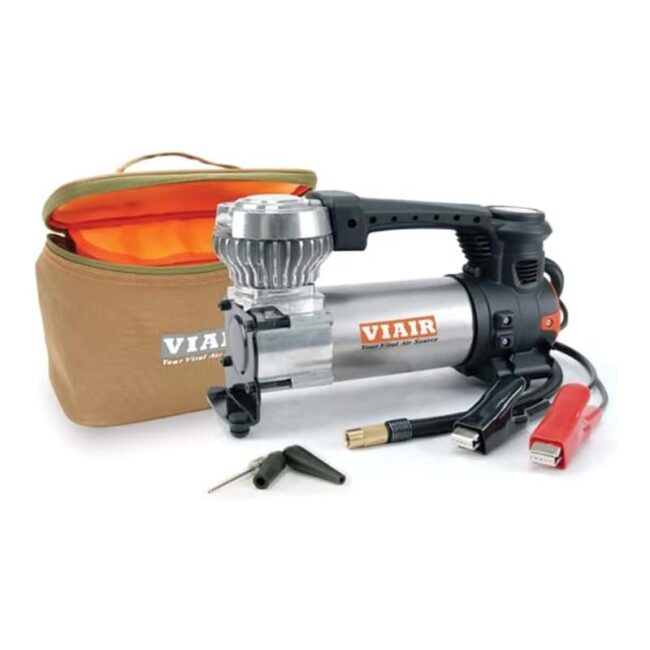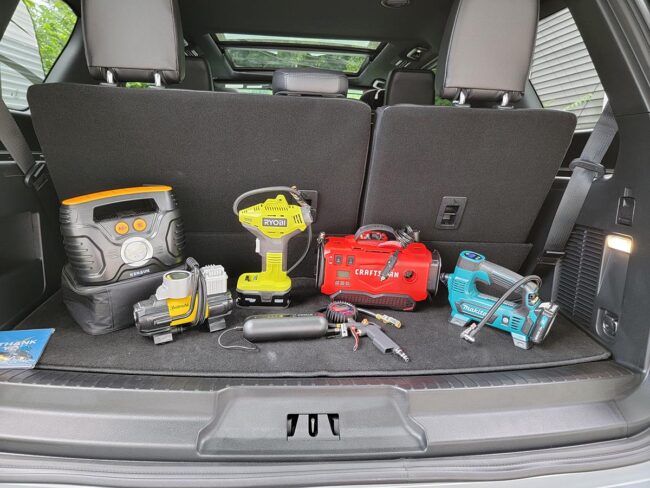
We may earn revenue from the products available on this page and participate in affiliate programs. Learn More ›
Most drivers have looked down at their dashboard and noticed a warning light indicating a tire with low pressure. If you drive for a minute or so and the light stays on, it’s time to take action and check those tires. You can either pay for air at the gas station pump or grab a trusty tire inflator and handle the problem on your own.
Whether it’s battery-operated, 120-volt electric, or one that plugs into the car’s 12-volt system, the right tire inflator is just the ticket when a motorist is in a pinch. In no time at all, these tools can boost a low tire to optimal pressure.
Choosing the best tire inflator for DIY needs helps keep your vehicle running at its best. From poor gas mileage to terrible ride quality, tires low on pressure can make driving problematic. So for that reason, I researched and field-tested for more than 2 days, so DIYers can be certain to arm themselves with one of the best tire inflators available. Our top pick, the DeWalt 20V MAX Corded/Cordless Air Inflator, is easy to read and use, has three power options, and comes with multiple accessories. See which other tire inflators ranked.
- BEST OVERALL: DeWalt 20V MAX Corded/Cordless Air Inflator
- RUNNER-UP: Makita 12V MAX CXT Lithium-Ion Cordless Tire Inflator
- UPGRADE PICK: Milwaukee M18 18V Cordless Tire Inflator
- BEST FOR AIR COMPRESSORS: AstroAI 250 PSI Digital Tire Inflator With Gauge
- BEST PLUG-IN FOR HOME: Kensun Portable Tire Inflator and Air Compressor Pump
- BEST MINI INFLATOR: Airmoto Portable Smart Air Pump
- BEST FOR OFF-ROAD: Viair 88P Portable Compressor
- BEST FOR BIKES: Cycplus A2 Electric Air Pump
- ALSO CONSIDER: Craftsman V20 Cordless Inflator
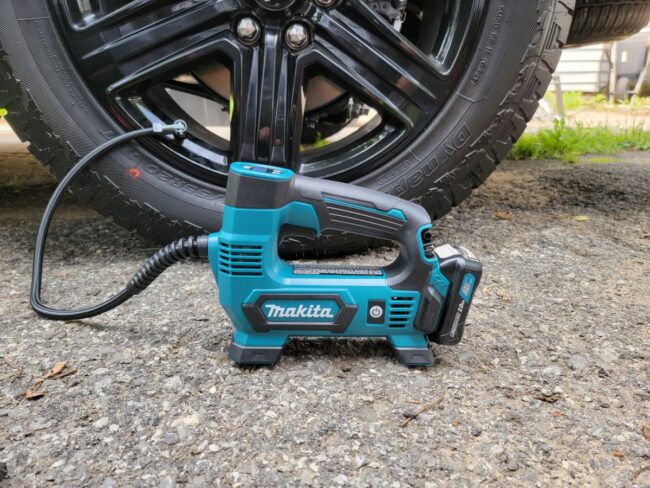
| Type | PSI | Model number | |
| DeWalt 20V MAX Corded/Cordless Air Inflator | Battery-powered, 12-volt (V) DC for car plug-in, or 110V AC for home | 160 | DCC020I |
| Makita 12V MAX CXT Lithium-Ion Cordless Tire Inflator | Battery-powered | 120 | MP100DZ |
| Milwaukee M18 18V Cordless Tire Inflator | Battery-powered | 150 | 2848-20 |
| AstroAI 250 PSI Digital Tire Inflator With Gauge | Accessory | 250 | 250PSI-M |
| Kensun Portable Tire Inflator and Air Compressor Pump | 12V DC car plug-in or 110V AC for home | 120 | KC-H |
| Airmoto Portable Smart Air Pump | Built-in battery | 120 | BP198 |
| Viair 88P Portable Compressor | 12V battery clamps | 120 | 88P |
| Cycplus A2 Electric Air Pump | Battery-powered | 150 | A2 |
| Craftsman V20 Cordless Inflator | Battery-powered, 12V DC for car plug-in, or 120V AC for home | 160 | CMCE520B |
Our Top Picks
After testing and comparing results, I ranked these tire inflators based on relative strengths and features. Here’s where each product landed in the lineup.
Best Overall
DeWalt 20V MAX Corded/Cordless Air Inflator
See ItWhat We Like
- Gauges are easy to read and set; digital meter on the side provides a helpful visual aid
- Features 3 power options for greater usability in a variety of scenarios
- Comes with multiple accessories and everything stores securely onboard
What We Don’t Like
- Larger batteries can prevent the feet from contacting the ground, resulting in quite a bit of chatter and movement
Product Specs
- Type: Battery-powered, 12-volt (V) DC for car plug-in, or 110V AC for home
- PSI: 160
- Model number: DCC020I
This Bob Vila Approved product carries our brand’s highest level of recommendation.

Bob Vila Approved recognizes the household and DIY products that impressed us most in our real-world testing and that exemplify core values of the Bob Vila brand, including craftsmanship, innovation, and value for the dollar. Winners of this designation come recommended by our professional review team and are personally approved by Bob Vila.
Shoppers looking for a top-notch tire inflator will want to consider this DeWalt model. The compressor runs on the brand’s 20V MAX battery system, allowing DeWalt users to take advantage of their existing batteries. It’s also compatible with 12V direct current (DC) outlets in vehicles and comes with a detachable cord that stores onboard safely.
This model has a digital gauge that’s easy to read and even easier to understand. You can set the pressure using the gauge and then follow the digital pressure meter that displays hash marks as the pressure climbs. It also comes with a high-volume tube for inflatables, a high-pressure hose, a sports ball needle, and an adapter for Presta valves.
I definitely enjoyed using the DeWalt inflator during the test. There was plenty of onboard storage for all of the accessories, and everything stored securely in place. I also liked the digital gauge as it was easy to set, and the meter provided a simple visual reference to use. It was relatively quiet for a tire inflator of this size, but there is a catch: I ran my test inflator off of a rechargeable DeWalt battery. The battery was a 6 amp-hour (Ah) battery, and it was too tall for the tire inflator’s rubber feet to touch. As a result, it did bounce around and chatter a bit. However, it had plenty of power and boosted our test tire up quickly, and the flexible power options are convenient; however, it doesn’t come with a battery, charger, or 120V alternating current (AC) cord adapter.
Get the DeWalt tire inflator at Amazon, Lowe’s, or The Home Depot.
Runner-Up
Makita 12V MAX CXT Lithium-Ion Cordless Tire Inflator
See ItWhat We Like
- Battery operated so users can take it anywhere they need to go
- Light weight allows for comfortable handling without user fatigue over long periods
- Quickly fills a tire and has a maximum output pressure of 120 PSI
- Desired pressure is easy to set and the gauge is accurate within 1 PSI
What We Don’t Like
- Onboard accessory storage makes it tricky to fit everything neatly without it falling off
- Hose storage system could use a redesign; can stick out awkwardly while stored
Product Specs
- Type: Battery-powered
- PSI: 120
- Model number: MP100DZ
The battery-operated Makita 12V MAX CXT cordless tire inflator can pump up to 120 PSI of pressure into a car, bike, or lawn tractor tire. At just 2.13 pounds, it’s compact and lightweight, so there’s no need to lug a large, unwieldy compressor to the tire. The high-visibility pressure gauge shows exactly how much air pressure is in the tire. By presetting the CXT, it even turns off automatically when the tire reaches the desired PSI.
I found that there was a lot to like about this Makita tire inflator during testing. It had plenty of power (filling the fastest of all the inflators in the group) while being compact and comfortable to hold during inflation. The pressure was easy to set, and the gauge was accurate to within 1 PSI of the vehicle’s tire pressure monitor. The onboard storage system and the hose storage are a bit finicky, making it difficult to secure all the accessories and the hose, which is why it didn’t quite make the top spot on this list. Otherwise, there’s a lot to like about the Makita.
Get the Makita tire inflator at Amazon, The Home Depot, or Acme Tools.
Upgrade Pick
Milwaukee M18 18V Cordless Tire Inflator
See ItWhat We Like
- Plenty of power for quickly filling up a truck tire from 25 to 35 PSI
- Pressure stabilization ensures that the tires actually reach their desired pressures
- Maximum pressure of 150 PSI provides plenty of pressure for almost any DIY task
What We Don’t Like
- Louder than most other tire inflators
- Large in size and weight, making it more difficult to easily stash in a vehicle
Product Specs
- Type: Battery-powered
- PSI: 150
- Model number: 2848-20
If an upgraded tire inflator is in the cards, be sure to consider the Milwaukee M18 18V cordless tire inflator. This model uses the brand’s M18 18V batteries, so Milwaukee power tool users can rely on their supply of rechargeable batteries to inflate their tires. It has a large digital gauge that users can set to their desired pressure, allowing the tire inflator to do the rest of the work.
This tire inflator features TrueFill Technology. It shuts the tire inflator off when the tire reaches the desired pressure. However, it waits for the pressure in the tire to stabilize and then kicks back on if the pressure drops below the desired pressure upon stabilization. This ensures that the tires are inflated and working properly.
The M18 tire inflator features onboard storage for its hose, an inflation needle, an inflation nozzle, and the Presta valve adapter. It also has a maximum pressure of up to 150 PSI.
I didn’t think that pressure stabilization was a big deal before using this compressor, but now that I’ve seen it in action, it’s worth the upgrade. This tire inflator will cycle on and off several times until the pressure is on point. Also, the digital gauge was very easy to set, and it had plenty of power for quickly filling a tire from 25 to 35 PSI. However, it is important to dial it down when pumping up a bicycle tire as this inflator pumps a lot of air quickly.
In testing, I only had two complaints about the Milwaukee. First, it was the loudest of the inflators on this list. Second, it’s pretty large both in weight and size: 7 pounds without the battery and 7.8 inches tall by 13.8 inches wide by 6.4 inches deep. Note that this inflator is usually tool only, without a battery or charger unless otherwise noted.
Get the Milwaukee tire inflator at Amazon, The Home Depot, Walmart, or Acme Tools (with battery and charger).
Best for Air Compressors
AstroAI 250 PSI Digital Tire Inflator With Gauge
See ItWhat We Like
- The digital gauge is easy to read for accurate pressure measurements
- Comes with a valve stem tool so you can replace your own valve stems
- Compatible with most compressors and fills fast and accurately with a heavy-duty air compressor
What We Don’t Like
- Performance depends on the compressor used; light-duty units may be disappointing
- Valve connection needs constant attention as it can leak if not positioned properly on the valve stem
Product Specs
- Type: Accessory
- PSI: 250
- Model number: 250PSI-M
Car owners who already own an air compressor don’t need one of the tire inflators on this list. Instead, they can just use this tire inflator accessory from AstroAI. This valve unit comes with a threaded brass fitting and a comfortable squeeze trigger, plus an easy-to-read backlit digital gauge. The digital gauge turns on automatically when it senses pressure and shuts off after 20 seconds. This valve can handle up to 250 PSI, which is enough to fill most tires. It comes with a ¼-inch quick-connect fitting that easily snaps onto most air hoses.
I enjoyed using this AstroAI tire inflator with my compressor, as the gauge was easy to read and very responsive once I let go of the trigger to check the pressure. I did have to wiggle the connection between the tire valve and this inflator a few times, which may be a bit of a downside to some. Overall, it filled my truck tires very quickly and accurately when hooked to my heavy-duty air compressor. For light-duty compressors, however, it might not fill as quickly.
Get the AstroAI 250 PSI tire inflator at Amazon, Walmart, or AstroAI.
Best Plug-in for Home
Kensun Portable Tire Inflator and Air Compressor Pum
See ItWhat We Like
- Simple to use as it has just 2 buttons, providing an uncomplicated operation experience
- Comes with a carrying case to help keep everything neat and organized in the car
- Powerful for being a car plug-in, making it a solid tire inflator for repairs on the road
What We Don’t Like
- Difficult to wrap up and put away in the carrying bag as it is a bit small
- Analog gauge is tough to read compared to all of the digital models in the test
- Larger size might be too bulky for vehicles with smaller trunks
Product Specs
- Type: 12V DC car plug-in or 110V AC for home
- PSI: 120
- Model number: KC-H
Flexibility matters, and the Kensun is a portable air compressor and tire inflator that works with 12V power from a vehicle and 110V power from a home. With this kit, shoppers get a needle for sports balls and an adapter for blowing up pool floats and other inflatables. It has a maximum pressure of 120 PSI and will work for 30 minutes before shutting off automatically.
One of the best features that I found in the Kensun portable air compressor is that it’s incredibly simple to operate. There are only two buttons, one for each power source. Beyond that, it was effective and powerful enough to fill a truck tire and had no problem with the bike tires or basketball. The gauge isn’t incredibly accurate compared to the vehicle’s monitoring system, nor was it easy to read, and I did have to sit by it to make sure it didn’t overinflate the tire as it can’t be preset to shut off at a certain PSI setting.
Get the Kensun tire inflator at Amazon, Walmart, or Kensun.
Best Mini-Inflator
Airmoto Portable Smart Air Pump
See ItWhat We Like
- Compact size allows it to stow away in a glove box in case of emergencies
- Surprisingly powerful and not loud for its size and the air it produces
- The gauge makes reading indoors very easy; the large display is intuitive and detailed
What We Don’t Like
- The digital gauge can be hard to read in the direct sun
Product Specs
- Type: Built-in battery
- PSI: 120
- Model number: BP198
Folks looking for a small tire inflator that can easily fit in a glove box might want to consider the Airmoto portable air pump. This small compressor weighs 1.2 pounds and measures 6 inches long, making it handy to keep in a glove box. It runs on a rechargeable battery (with included cord) and fully charges in 2 hours and 40 minutes.
This tire inflator features a digital gauge for dialing in the correct pressure as well as onboard hose storage. It also comes with a carrying bag and several nozzle adapters as well. It has a built-in LED flashlight and can produce up to 120 PSI—a stunning feat from such a small tire inflator.
In testing, this small tire inflator was a pleasant surprise. First, I was shocked at how long the battery lasted. It was able to inflate a basketball, a bike tire, and a full-size truck tire before it died. I also liked that the onboard hose storage and the carrying bag kept everything together. This model wasn’t loud during use, and it’s light enough to let it hang from the valve while it fills the tire. The only downside I noticed was that the digital gauge was a bit hard to read in the sun.
Get the Airmoto tire inflator at Amazon or Airmoto.
Best for Off-road
Viair 88P Portable Compressor
See ItWhat We Like
- Very powerful—capable of filling large truck tires faster than the other models in the test
- Cables and hose combine to offer plenty of reach for back wheels and other areas
- Metal and high-quality plastic provide quality, rugged construction
- The carrying case keeps the compressor clean from dust and debris while off-road
What We Don’t Like
- Battery clamps make sense for off-road, but a 12V port adapter would also fit in the bag
Product Specs
- Type: 12V battery clamps
- PSI: 120
- Model number: 88P
When it comes to pumping up a tire on the trail, the Viair 88P portable compressor may be the right choice. This compressor features a rugged design with rubber feet and durable metal and plastic construction. It comes in a carrying case that will keep it clean in dusty off-road settings as well.
The Viair runs on a vehicle’s 12V battery, but instead of plugging into a 12V port, you attach two clamps directly to the battery. It has a maximum pressure of 120 PSI and can quickly fill a 33-inch tire from 0 to 30 PSI in around 5 minutes and 45 seconds. It comes with a 16-foot long hose, an analog gauge, a Presta adapter, a built-in work light, and three inflation tips.
This is one burly tire inflator. The quality construction is evident from the weight and materials, and it quickly boosted my test truck tire up. Between the cables and the air hose, it has plenty of reach for large vehicles as well. I liked that it was so powerful, and the carrying case is a huge plus for folks in dusty off-road conditions. It is a bit of a concern that this model can only run on the battery with clamps and not in one of the 12V ports, but it does ensure that any vehicle can operate it.
Get the Viair tire inflator at Amazon or The Home Depot.
Best for Bikes
Cycplus A2 Electric Air Pump
See ItWhat We Like
- Only 7 inches long, making it great for traveling and stashing in a glove box
- Surprisingly powerful for such a small unit as it was able to pump a truck tire
- Fits neatly on a bike frame, which could make it a great choice for a bike commuter
What We Don’t Like
- Heats up pretty quickly during use, so it may not be ideal for pumping vehicle tires often
Product Specs
- Type: Battery-powered
- PSI: 150
- Model number: A2
For a portable tire inflator that fits easily in a glove box or backpack, this inflator from Cycplus is a good choice. This tiny pump is just 13.4 ounces and 7 inches long by 2.1 inches thick, making it suitable for extra-long bike rides. Plus, it produces up to 150 PSI of pressure to inflate car tires, motorcycle tires, or sports equipment as well. It also has a built-in LED flashlight and a digital pressure gauge. It charges completely in 3 to 4 hours and functions as a portable power bank for charging cell phones and other electronics. It also features convenient onboard storage for the air tube and other accessories.
Incredibly, this mini inflator was the big surprise in the group. It’s not rated for a truck tire, but because I don’t own a car, a truck tire had to do. It handled the job. It did get hot, and the battery was only capable of filling one tire after filling the basketball and bike tires, but it did the trick. It’s so small that it fits in a glove box, but it’s powerful enough to get a low tire up to snuff. I don’t think I’d use it to fill several tires, but it’s great in a pinch on the road or on the trails.
Get the Cycplus tire inflator at Cycplus.
Also Consider
Craftsman V20 Cordless Inflator
See ItWhat We Like
- Noticeably higher maximum pressure than many of the other tire inflators
- Onboard storage helps keep attachments and wires neat and organized
- 3 power options with 20V battery, 120 AC wall plug, and 12V DC car adapter plug
What We Don’t Like
- Though portability isn’t an issue, it is heavier than some other options
- Bulky and not storage-friendly, so it might be too large for some trunks
Product Specs
- Type: Battery-powered, 12V DC for car plug-in, or 120V AC for home
- PSI: 160
- Model number: CMCE520B
For a high-quality battery-powered tire inflator that provides plenty of power options, the Craftsman V20 cordless tire inflator is worth a look. This inflator runs on 120V or 12V power and comes with a 4Ah battery to ensure strong inflation power. It also includes a 20-inch hose, a digital pressure gauge with a regulator, and onboard cord and hose storage. This Craftsman tire inflator has a maximum pressure of 160 PSI, providing plenty of pressure for filling car and truck tires. Once it reaches the desired pressure, this inflator’s automatic shutoff will turn the compressor off, eliminating the risk of overinflating tires.
Testing proved that this Craftsman is a quality compressor, and the increased pressure over other models is really a standout feature. I liked that all the storage was onboard for the different valve attachments, both AC and DC wires, as well as the flexible hose for floats and air mattresses. I also liked that it sits securely on the ground while filling, which is especially nice when coupled with the automatic shutoff. It filled to within 1 PSI of the vehicle’s TPMS reading, which I felt was very accurate. What I didn’t like, however, is that the gauge is very hard to read in the sun.
Get the Craftsman tire inflator at Amazon, Lowe’s, Ace Hardware, Walmart, or Blain’s Farm & Fleet.
ALSO TESTED
Unfortunately, not all of our tire inflators had what it takes to land on our list. This Slime 12V tire inflator’s built-in gauge was the main issue. It was nowhere near accurate, leaving me guessing every time I plugged it in and hooked it up to a tire. It was underpowered and loud, and the plastic construction seemed to be of low quality from the moment I started using it. It does have a built-in flashlight and onboard storage for the cord and hose, but overall, it’s probably best to avoid it.
Jump to Our Top Picks
How We Tested the Best Tire Inflators
To ensure that I recommended the best tire inflators possible, I put the models on this list to the test. I used a truck tire, a bicycle tire, and a basketball as my test subjects.
For the bicycle tire, I deflated the tire as much as possible between filling and pumping it back up with the compressor. I checked to see how easy each model was to connect to a finicky, loose bicycle stem and to ensure it was easy to control while inflating.
For the basketball, I inserted the filler needle into the ball and deflated it between each test. I then attached each compressor to see how it would do.
The final test was pumping up a low vehicle tire. Even though many of these models aren’t rated for truck tires, I don’t own a car, so truck tires had to do. I deflated the tire from 35 pounds per square inch (PSI) to 25 PSI, using the vehicle’s tire-pressure monitoring system as a reference as well as a tire gauge. Once the pressure was low enough, I connected a tire inflator and timed how long it took to pump the tire up. This gave me an excellent idea of the power and battery life these inflators could offer.
What to Consider When Choosing a Tire Inflator
When shopping for a tire inflator, you have a lot of features to think about. From convenience and portability to pressure and power source, pay attention to these factors and more to help you make the right choice.
Power Source
Tire inflators use electric motors and pumps to fill tires. They need a power source to do that, and there are two options: corded and cordless.
Corded inflators that use 12V power plug into a vehicle’s 12V jack to run off the car’s battery. Some may clip directly to the battery, like jumper cables. These inflators are convenient because they don’t require keeping an additional battery charged. As long as the car’s battery has power, the inflator can operate.
While most corded inflators run on 12V power, some flexible models use both 12V and 120V power. These models plug into a standard electrical outlet as well as 12V jacks.
Cordless inflators are battery-operated and use rechargeable batteries to power the motor and pump. Some cordless inflators have built-in batteries that charge via USB or 120V power, while others have removable batteries.
Cordless inflators offer quite a bit more flexibility than a corded 12V inflator, as they don’t require an additional power source to fill a tire. For this reason, they’re just as good at filling flat tires on bikes and sports equipment as they are at pumping pressure into car tires.
Pressure
When it comes to tire inflators, pressure usually equals speed. The higher the pressure a tire inflator can produce, the quicker it can fill to the required tire pressure. In order to avoid spending too much time filling a tire, look for a compressor with at least 100 PSI. However, an inflator with a maximum pressure of 150 PSI will have it up and running even faster. Most tire inflators can fill a car’s tire to the recommended 30 to 40 PSI without an issue.
Inflation Time
When choosing a tire inflator, the amount of time it takes to pump up a tire can be a significant factor. Inflation time can run from around 10 minutes up to 20 or 30 minutes, depending on the tire inflator and its output. The less time spent filling a flat tire, the sooner the vehicle or bike can get on the road.
Duty Cycle
Air compressors operate on what’s known as a “duty cycle.” The duty cycle describes how long a compressor can run before needing a certain amount of time to cool down.
Many tire inflators can only run for 15 minutes or so before needing a break. They have to run at high speeds to produce the amount of pressure necessary, and compressing air creates heat. Also, their compact design causes them to retain that heat, so they’re not able to run as long as a pancake or full-size compressor. These larger compressors can fill a tank with air and then shut off, making duty cycle less of a consideration (except in commercial settings).
A shorter duty cycle is rarely an issue when filling pool floats or sports equipment, but it can be a drawback when filling large truck tires. For that reason, many portable tire inflators clearly state they’re not designed for truck tires, though anything can help in a pinch.
Gauge Readability
To get the most wear and mileage out of car tires, fill them with the optimal amount of pressure that the manufacturer recommends. This is usually around 35 PSI.
To put the proper amount of air into the tire, a tire inflator needs a gauge that’s easy to read. Inflators with digital gauges are the easiest, especially if they are backlit or have a light in the background. However, analog gauges also work well if their faces have large numerals. Most analog gauges don’t have a backlight, though, so they can be challenging to read in low-light situations.
Automatic Shutoff
Small air compressors are stout, tough machines, but they can overheat if they run too long. Manufacturers protect their tire inflators by including automatic shut-off functions.
The three measurements that a tire inflator can take before shutting off automatically are pressure, temperature, and time. A pressure shutoff is particularly handy, as it can be set to the desired pressure, and the inflator will stop pumping air once the tire reaches it. Likewise, if the tire inflator starts reaching a dangerous temperature, typically around 200 degrees Fahrenheit, it will shut down until it cools off. A built-in shutoff could also begin a cooldown process after running for a prescribed amount of time, which is usually around 15 minutes.
Hose Length
Trying to fill a tire with a short hose isn’t much fun, but tripping over a long, tangled hose isn’t much better. A tire inflator with a 16- to 20-inch hose generally works best—long enough to easily reach most tires but still manageable.
For a longer hose that’s also manageable, look for a tire inflator with a coiled hose. These hoses stretch considerably, often enough to fill each of the four tires without moving the compressor. These inflators can be very helpful for off-road enthusiasts and large vehicles like pickup trucks and SUVs.
Weight and Portability
People often look for a tire inflator over a standard air compressor because they’re light and portable—and that’s an excellent reason. A tire inflator can often weigh less than a pound, so users can carry it in one hand.
For road trips, a tire inflator can be a handy tool, though trunk space can get tight on a longer trip. A compact inflator can fit nicely in the trunk without taking up valuable space needed for luggage or snacks. Most tire inflators fit this bill, but compact models take up even less space and can sometimes even fit in a glove box.
Ease of Use
While tire inflators are often simple by design, there are a few features that can make using them even easier. For example, a programmable pressure regulator will prevent overfilling the tire. Another handy feature is a built-in pressure gauge. This shows how much pressure is going into the tire without having to remove the hose to check it with a separate tire gauge.
Tips for Using a Tire Inflator
- Fill the tire to the recommended pressure. Before filling a tire, check the sidewall of the tire (for vehicles and bikes) or inside the vehicle’s door to determine the pressure that the manufacturer recommends. With cars and trucks, this is usually between 30 and 40 PSI. Filling a tire within this range leads to even tread wear, a comfortable ride, and better gas mileage. For bicycles, the PSI can range anywhere from 20 to 130 PSI depending on the size and style of tire.
- Check for punctures in the tire if the inflator isn’t building pressure. If a tire inflator has difficulty making progress, it might not be the inflator’s fault. There may be a hole in the tire caused by a puncture or excessive wear. Be sure to check the condition of the tire if the inflator can’t build pressure like it’s supposed to.
- Use an adapter to fill bike tires with Presta valves (available at Amazon). When attempting to fill a bike tire, sometimes the inflator’s hose doesn’t latch onto the valve stem; this could be because the bike has a different style of stem. Most car and bike tires use Schrader valves, but some cycling tires use Presta valves, which may require an attachable adapter.
FAQs
If you still have some questions about your new tire inflator, don’t worry. This section answers the most frequently asked questions about tire inflators.
Proper tire pressure helps maintain even tread wear on vehicle tires, allowing for the longest possible life out of a tire set. Proper pressure also improves gas mileage.
The easiest way to check the tire pressure is with a pressure gauge (available at Amazon). Just remove the valve cap and press the gauge onto the tire’s valve to get a reading.
This value is usually available in the driver’s side door jamb, on a label prescribing the correct pressures. However, for older vehicles and bicycles, check the tire’s sidewall for the recommended PSI. It can be hard to read, so have a wet rag handy to wipe off dirt and grime.
Air condenses in colder temperatures, so tire pressure drops in cooler seasons. The first chilly mornings of fall usually create a line of cars at gas station tire pumps—a good reason to keep a tire inflator at home.
Meet the Tester
Tom Scalisi is a freelance writer specializing in the home design, construction, and automotive industries. Having been in the trades for more than 15 years as both a contractor and a commercial building mechanic, he shares his expertise with readers of Bob Vila, This Old House, Family Handyman, and even his pest control blog.
